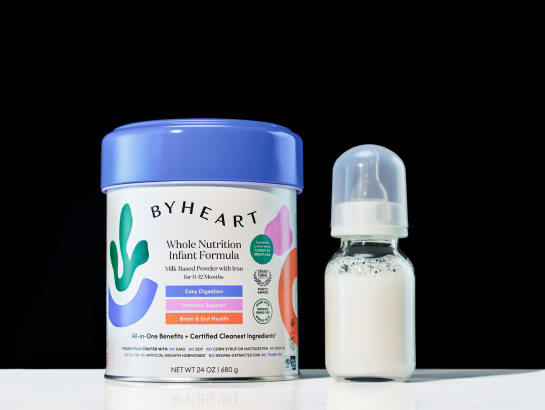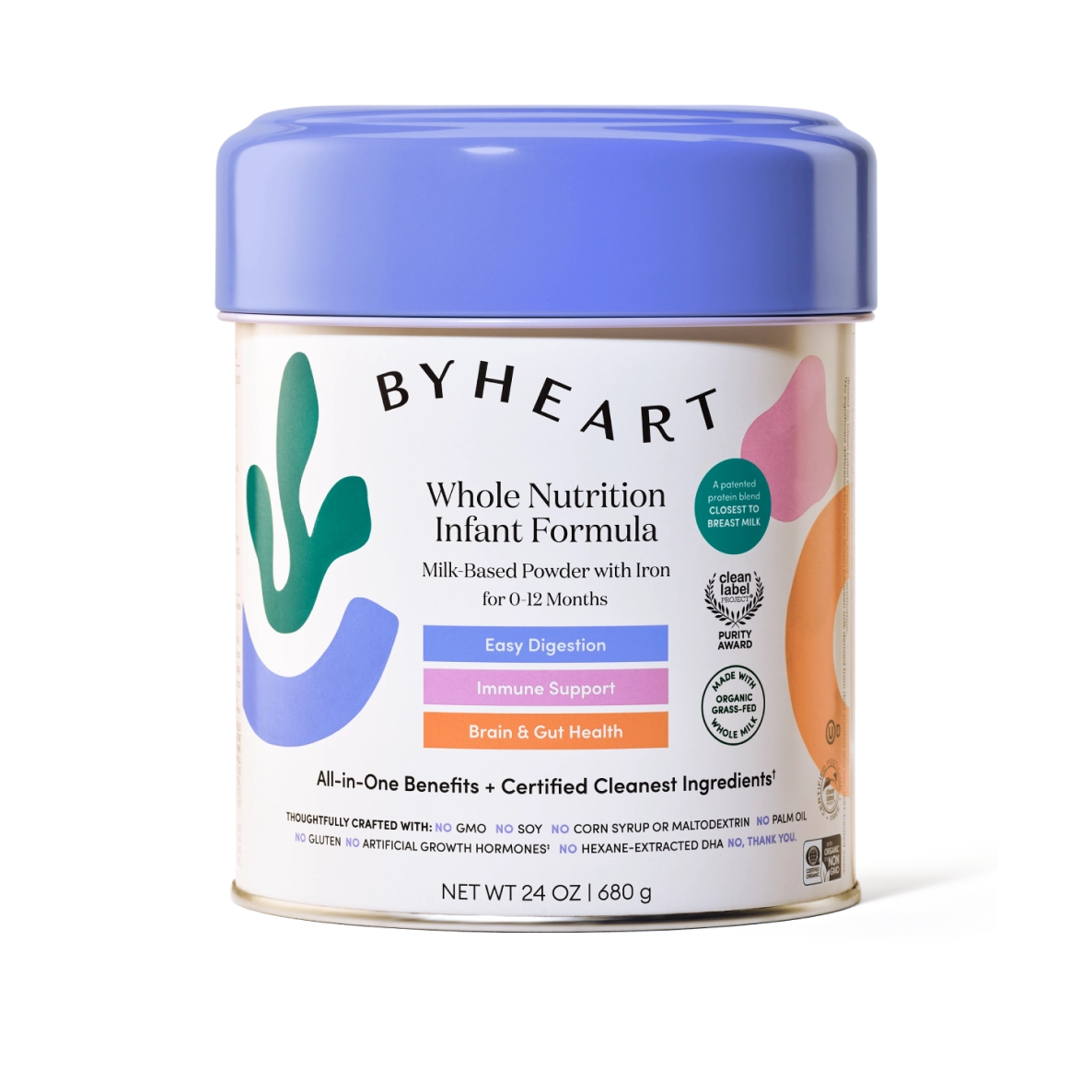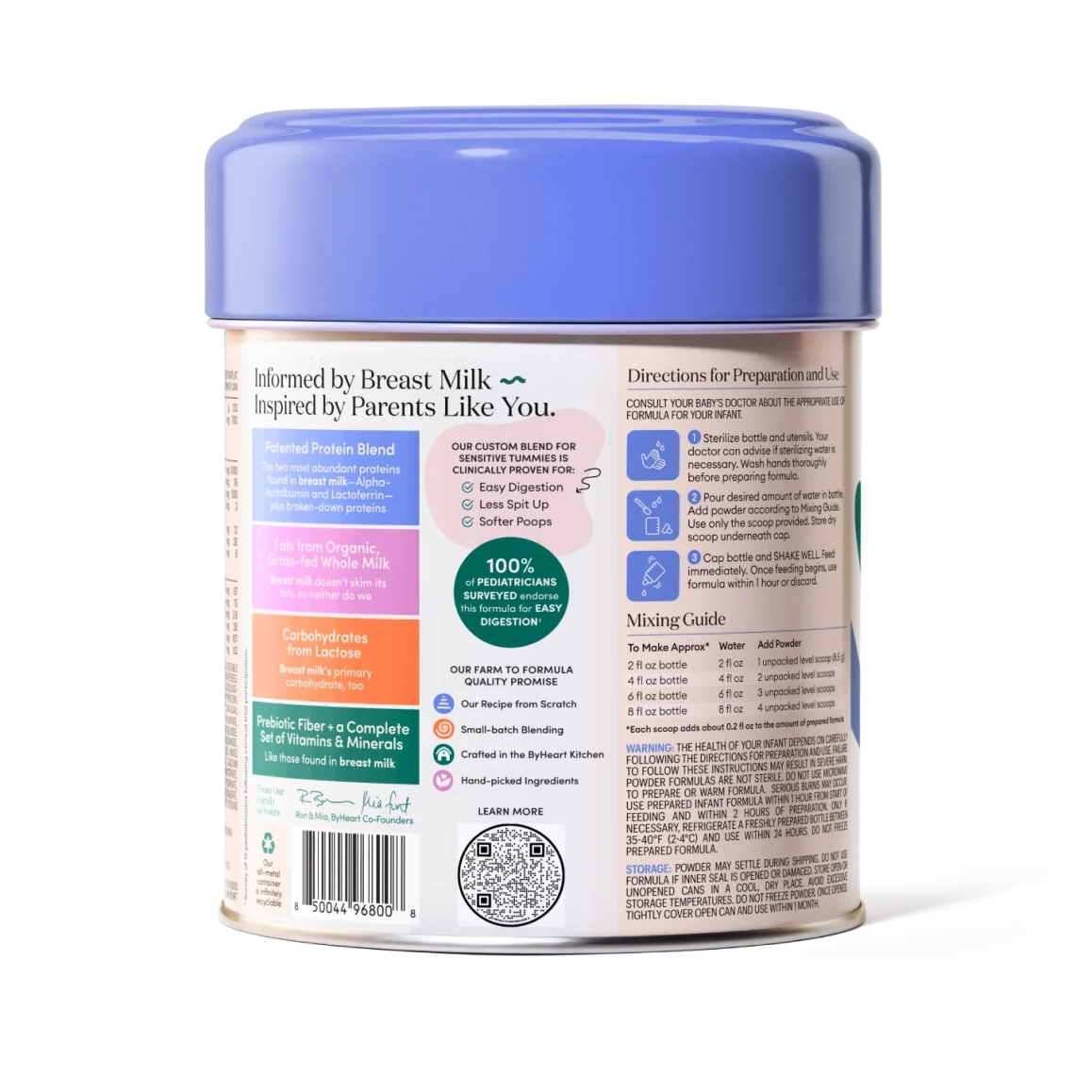Innovated for easy digestion—with clinically proven outcomes.
Designed for healthy, full-term infants 0-12 months of age, ByHeart’s Whole Nutrition Infant Formula features a patented protein blend that gets closest to human milk. Plus, it’s made with organic, grass-fed whole milk (never skim), carbohydrates from lactose (like human milk), and certified-clean* ingredients with no corn syrup, soy, or palm oil.
* Based on Clean Label Project, Purity Award certification
Providing the foundation for long-term health for babies.
Research has shown that early nutrition has lasting implications for long-term health and development. Here we highlight some fundamental vitamins and minerals that have been added to ByHeart to support growth and development during the first 1,000 days of life.
Omega-3 fatty acids are necessary for outcomes like brain development and visual acuity.1,2 While DHA often receives ample attention, the ratio between DHA and ARA (another essential fatty acid) is particularly important in early life, as DHA and ARA work together to support infant health.1,3
While choline is neither a vitamin nor mineral (it is rather an organic, water-soluble compound), it is an essential nutrient typically categorized with B vitamins due to its similarities.12 Choline is important for outcomes including overall growth and development, particularly brain and nervous system development.13
Zinc is important for cell division and growth, bone health, immune system and brain development.7 Interestingly, zinc is a cofactor for hundreds of enzymes and is involved in hormone production and gene expression.7
Vitamin D enhances the absorption and utilization of calcium.4,5 Calcium is crucial for bone mineralization, which supports skeletal growth and strong bones and teeth.6 Vitamin D also supports immune system and brain development, and respiratory health.4-6
Iodine is vital for thyroid hormone synthesis and brain development.7 Research has demonstrated a link between iodine deficiency and adverse metabolic and neurocognitive outcomes (in fact, it is the most common cause of preventable intellectual disabilities worldwide).14,15
Iron is critical for brain development, the formation of red blood cells, immune development, and cognition.7 ByHeart features lower iron than many other infant formulas because we understand that while too little iron is problematic, so is too much.8,9 Healthy term infants are equipped with iron stores at birth that support iron needs during their first 4-6 months, in addition to the dietary iron consumed from formula or breastmilk.8,9 Fun fact, lactoferrin (another star ingredient in ByHeart) is a protein found in human milk that enhances non-heme iron bioavailability.10,11
Selenium is a potent antioxidant that protects cells from oxidative stress.16 It also plays key roles in immune system and brain development, thyroid hormone metabolism, and overall growth.16
Birch EE, Carlson SE, Hoffman DR, et al. The DIAMOND (DHA Intake And Measurement Of Neural Development) Study: a double-masked, randomized controlled clinical trial of the maturation of infant visual acuity as a function of the dietary level of docosahexaenoic acid. Am J Clin Nutr. 2010;91(4):848-859. doi:10.3945/AJCN.2009.28557
Drover JR, Hoffman DR, Castañeda YS, et al. Cognitive function in 18-month-old term infants of the DIAMOND study: a randomized, controlled clinical trial with multiple dietary levels of docosahexaenoic acid. Early Hum Dev. 2011;87(3):223-230. doi:10.1016/J.EARLHUMDEV.2010.12.047
Colombo J, Jill Shaddy D, Kerling EH, Gustafson KM, Carlson SE. Docosahexaenoic acid (DHA) and arachidonic acid (ARA) balance in developmental outcomes. Prostaglandins Leukot Essent Fatty Acids. 2017;121:52. doi:10.1016/J.PLEFA.2017.05.005
Christakos S, Dhawan P, Porta A, Mady LJ, Seth T. Vitamin D and Intestinal Calcium Absorption. Mol Cell Endocrinol. 2011;347(1-2):25. doi:10.1016/J.MCE.2011.05.038
Wagner C, Greer F; Section on Breastfeeding and Committee on Nutrition. Prevention of Rickets and Vitamin D Deficiency in Infants, Children, and Adolescents. Pediatrics. 2008;122(5):1142–1152. https://doi.org/10.1542/peds.2008-1862
Institute of Medicine, Food and Nutrition Board. Dietary Reference Intakes for Calcium, Phosphorus, Magnesium, Vitamin D, and Fluoride. Washington, DC: National Academies Press; 1997.
Institute of Medicine, Food and Nutrition Board. Dietary Reference Intakes for Vitamin A, Vitamin K, Arsenic, Boron, Chromium, Copper, Iodine, Iron, Manganese, Molybdenum, Nickel, Silicon, Vanadium, and Zinc. Washington, DC: National Academy Press, 2001.
Gallahan S, Brower S, Wapshott-Stehli H, Santos J, Ho TTB. A Systematic Review of Isotopically Measured Iron Absorption in Infants and Children Under 2 Years. Nutrients. 2024;16(22):3834. https://doi.org/10.3390/nu16223834
EFSA Panel on Dietetic Products, Nutrition and Allergies. Scientific Opinion on the essential composition of infant and follow-on formulae. EFSA J. 2014;12(7):3760, 45-49. doi:10.2903/j.efsa.2014.3760
Mikulic N, Uyoga MA, Mwasi E, et al. Iron Absorption is Greater from Apo-Lactoferrin and is Similar Between Holo-Lactoferrin and Ferrous Sulfate: Stable Iron Isotope Studies in Kenyan Infants. J Nutr. 2020;150(12):3200-3207. doi: 10.1093/jn/nxaa226.
Lönnerdal B. Nutritional roles of lactoferrin. Curr Opin Clin Nutr Metab Care. 2009;12(3):293-297. doi:10.1097/MCO.0B013E328328D13E
Institute of Medicine. Food and Nutrition Board. Dietary Reference Intakes: Thiamin, Riboflavin, Niacin, Vitamin B6, Folate, Vitamin B12, Pantothenic Acid, Biotin, and Choline. Washington, DC: National Academy Press; 1998.
Leermakers ET, Moreira EM, Kiefte-de Jong JC, Darweesh SK, Visser T, Voortman T, et al. Effects of choline on health across the life course: a systematic review. Nutr Rev. 2015;73:500-22.
Bougma K, Aboud FE, Harding KB, Marquis GS. Iodine and Mental Development of Children 5 Years Old and Under: A Systematic Review and Meta-Analysis. Nutrients. 2013;5(4):1384. doi:10.3390/NU5041384
World Health Organization. United Nations Children’s Fund & International Council for the Control of Iodine Deficiency Disorders. Assessment of iodine deficiency disorders and monitoring their elimination. 3rd ed. Geneva, Switzerland: WHO, 2007.
Institute of Medicine. Food and Nutrition Board. Dietary Reference Intakes: Vitamin C, Vitamin E, Selenium, and Carotenoids. Washington, DC: National Academy Press; 2000.
We don’t just make claims, we prove them. Our formula supports clinically proven* outcomes, including:
- Less spit-up
- Softer stools
- More efficient growth
- Higher serum essential amino acids**
A clinical trial 25 years in the making.
We ran one of the largest clinical trials for infant formula in 25 years—including 311 healthy, term infants over 6 months (we were also the first new brand to add a comparison to human milk). All this allowed us to understand the full impact of our innovation. Learn more about our clinical trial outcomes, published in the Journal of Pediatric Gastroenterology and Nutrition.

Parents can shop ByHeart in-stores nationwide, and 24/7 at byheart.com.
Stay up-to-date on the latest infant nutrition science & research.
Gain early access to exciting education events and discover impactful ways to get involved—alongside a network of thousands of pediatric healthcare professionals.
"*" indicates required fields

















